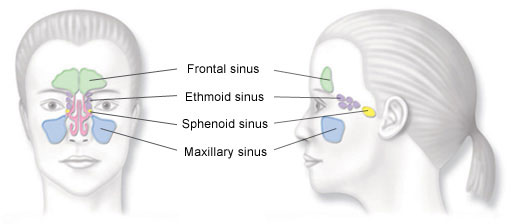Balloon Sinuplasty Sinus Surgery in Torrance, CA
Sinus Procedures with Balloon Sinuplasty
Balloon Sinuplasty (BSP) uses a small, flexible, balloon catheter to open up blocked sinus passageways and facilitate drainage of the mucus that builds up in patients suffering from chronic or recurrent acute sinusitis. When the sinus balloon is inflated, it restructures and widens the walls of the sinus passageway while maintaining the integrity of the sinus lining.
Unlike traditional sinus surgery, Balloon Sinuplasty requires no cutting and no removal of bone and tissue. Published clinical data shows that Balloon SInuplasty is safe and effective, and patients received statistically and clinically significant improvement in their sinusitis symptoms.1
The following illustrations show how Balloon Sinuplasty opens a blocked left maxillary sinus:

Step 1. A soft, flexible guidewire is inserted into the blocked sinus

Step 2. The balloon is advanced over the guidewire and is inflated to gently expand the sinus opening

Step 3. Fluid is sprayed into the inflamed sinus to flush out any pus or mucus.

Step 4. The balloon is removed, leaving the sinuses open.

Balloon Sinuplasty may now be performed in a doctor’s office under local anesthesia.
Balloon Sinuplasty (BSP) is a safe and effective procedure for many patients seeking relief from uncomfortable and painful sinusitis symptoms:
Most chronic sinusitis patients report clinically meaningful improvement in sinus symptoms and quality of life through 2 years following surgery.1
1. Weiss, et al. “Long-term outcome analysis of balloon catheter sinusotomy: Two-year follow-up.” Otolaryngology-Head and Neck Surgery, 2008, Vol. 139, pp. S38-S46.
For more information about Balloon Sinuplasty visit balloonsinuplasty.com.
Important Safety Information
Balloon Sinuplasty Technology is intended for use by or under the direction of a physician. Balloon Sinuplasty Technology has associated risks, including tissue and mucosal trauma, infection, or possible optic injury. Consult your physician for a full discussion of risks and benefits to determine whether this procedure is right for you.
![]() Powered by Encounter CSS ™ | Terms of Use
Powered by Encounter CSS ™ | Terms of Use

